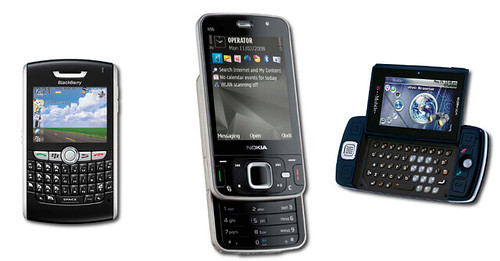In E-Primer 5 (still in draft form) I note the difficulties present in literature relating to what exactly is meant by the term, and the limitations of studies to date. In "A review of research methodologies used in studies on mobile handheld devices in K-12 and higher education settings" (AJET 25(2), 153-183) [PDF], Cheung & Hew (2009) provide an excellent precis of the problems and make insightful suggestions as to what ought to be done. In particular they point out the nature of the devices themselves. "Mobile" includes all handheld PDAs and all portable wireless devices and, of course, mobile phones. With this definition in mind, any specific mention of 'mobile' use in higher education needs some unpacking as it may imply anything from SMS to sharing multimedia to playing back MP3 files.
Cheung & Hew (2009) overview literature in m-learning with a particular focus on methodology. Their conclusion: the results of many studies need to be treated with some caution as most studies they exmained "used a weak experimental method that utilised a one group pretest design to examine student learning outcomes due to use of mobile handheld device use" (p.168). Tere is not enough comparable study being done witin the same context. Effect size estimates are also lacking, and there is a realiance on self-reported data. Cheung & Hew (2009) also list the short-term duration of most implementations as a barrier.
Clearly there is much more work to be done on the subject of m-learning; researchers would be best to consider the work of Cheung & Hew (2009) before getting started. An article in the same journal ("Advancing the m-learning research agenda for active, experiential learning: Four case studies" [PDF]) exemplifies the sort of research and transferability that is needed.
Cheung & Hew (2009) overview literature in m-learning with a particular focus on methodology. Their conclusion: the results of many studies need to be treated with some caution as most studies they exmained "used a weak experimental method that utilised a one group pretest design to examine student learning outcomes due to use of mobile handheld device use" (p.168). Tere is not enough comparable study being done witin the same context. Effect size estimates are also lacking, and there is a realiance on self-reported data. Cheung & Hew (2009) also list the short-term duration of most implementations as a barrier.
Clearly there is much more work to be done on the subject of m-learning; researchers would be best to consider the work of Cheung & Hew (2009) before getting started. An article in the same journal ("Advancing the m-learning research agenda for active, experiential learning: Four case studies" [PDF]) exemplifies the sort of research and transferability that is needed.

![Reblog this post [with Zemanta]](http://img.zemanta.com/reblog_e.png?x-id=504d4721-4712-4321-82ed-6d8c03a7f52b)





